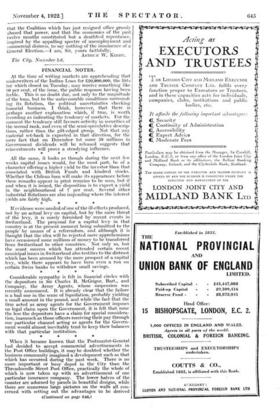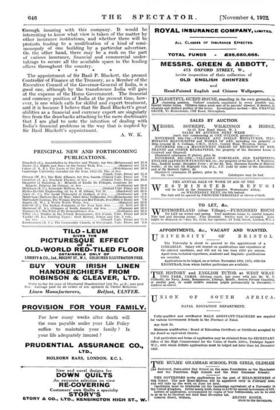FINANCIAL NOTES.
At the time of writing markets are apprehending that underwriters of the Indian Loan for £20,000,000, the lists for which closed on Tuesday, may receive something like 90 per cent, of the issue, the public response having been feeble. This is no doubt due, not only to the magnitude of the loan, but to the unfavourable conditions surround- ing its flotation, the political uncertainties checking financial business. I think, however, that there is perhaps another explanation which, if true, is worth recording as indicating the tendency of markets. For the moment the tendency still favours activity in securities of the second rank, and even of the semi-speculative descrip- tions, rather than the gilt-edged group. Not that any material set-back is expected in that direction, for the mere fact that on December 1st some 50 millions in Government dividends will be released suggests that reinvestments will prove a steadying influence.
All the same, it looks as though during the next few weeks capital issues would, for the most part, be of a character offering a higher yield to the investor than that associated with British Funds and kindred stocks. Whether the Chilean loan will make its appearance before these remarks appear in print remains to be seen, but if and when it is issued, the disposition is to expect a yield in the neighbourhood of 7 per cent. Several other industrial flotations are also impending where the interest yields are fairly high. * * * * If evidence were needed of one of the ill-effects produced, not by an actual levy on capital, but by the mere threat of the levy, it is surely furnished by recent events in Switzerland. The proposal for a capital levy in that country is at the present moment being submitted to the people by means of a referendum, and although it is thought that the idea will be rejected mere apprehensions have occasioned some millions of money to be transferred from Switzerland to other countries. Not only so, but the scant success which has attended certain recent municipal issues in Switzerland also testifies to the distrust which has been aroused by the mere prospect of a capital levy, while there appears to have been even a run on certain Swiss banks to withdraw small savings. * * * • * Considerable sympathy is felt in financial circles with the depositors in Sir Charles It. McGrigor, Bart., and Company, the Army Agents, whose suspension was recently announced. It is already clear that the failure is a bad one in the sense of liquidation, probably yielding a small amount in the pound, and while the fact that the firm acted as army agents for the Government imposes no legal claim upon the Government, it is felt that none the less the depositors have a claim for special considera- tion, inasmuch as those officers receiving their pay through one particular channel acting as agents for the Govern- ment would almost inevitably tend to keep their balances with that particular institution.
When it became known that the Postmaster-General had decided to accept commercial advertisements in the Post Office buildings, it may be doubted whether the business community imagined a development such as that. which has occurred during the past week. There is no more important or busy depot in the" City than the Threadneedle Street Post Office, practically the whole of which is now taken up with an advertisement of one particular insurance company. The lower halves of the counter are adorned by panels in beautiful designs, while there are numerous large pictures on the walls all con- cerned with setting out the advantages to be derived (Continued on page 646.1 through insuring with this company. It would be interesting to know what view is taken of the matter by other insurance institutions,' and whether there will be protests leading to a modification of a kind of semi- monopoly of one building by a particular advertiser. On the other hand, there may be a rush on the part of various insurance, financial and commercial under- takings to secure all the available space in the leading offices throughout the country.
The appointment of Sir Basil P. Blackett, the present Controller of Finance at the Treasury, as a Member of the Executive Council of the Governor-General of India, is a good one, although by the transference India will gain at the expense of the Home Government. The financial and currency position of India at the present time, how- ever, is one which calls for skilful and expert treatment, aild it is because I believe that Sir Basil Blackett's great abilities as a financial and currency expert are singularly free from the drawbacks attaching to the mere doctrinaire that I am glad to note the intention of dealing with India's financial problems in the way that is implied by Sir Basil Blackett's appointment. A. W. K.







































 Previous page
Previous page